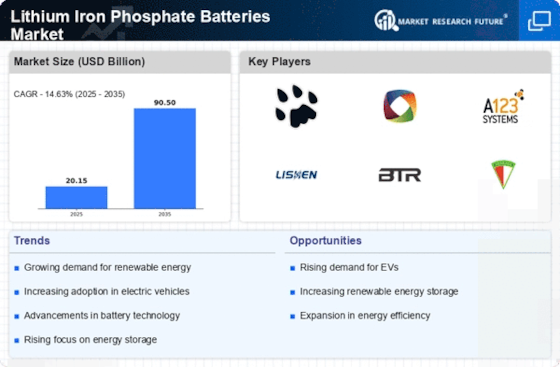Top Industry Leaders in the Lithium Iron Phosphate Batteries Market

*Disclaimer: List of key companies in no particular order
Introduction:
The Lithium Iron Phosphate (LFP) batteries market is witnessing a dynamic and competitive landscape, with a blend of established industry giants and nimble newcomers striving to carve out their share. Navigating this electrifying market requires a deep understanding of key player strategies, market share dynamics, and emerging trends.
Key Player Strategies:
Giants in Action: Established players such as CATL, LG Chem, Samsung SDI, and Panasonic are leveraging their brand recognition, extensive R&D capabilities, and global distribution networks to maintain dominance. CATL, in particular, is aggressively expanding its LFP production capacity to solidify its leadership position.
Emergence of Asian Challengers: Chinese companies like BYD, EVE Energy, and CALB are rapidly scaling up their LFP production, capitalizing on cost advantages and government support. Their emphasis on low-cost, high-volume offerings is particularly successful in gaining market share, especially in electric vehicles (EVs) and energy storage.
Vertical Integration: Leading players are pursuing backward integration into raw material sourcing and cell manufacturing to secure supply chains and reduce costs. LG Chem, for instance, has secured lithium resources in Argentina and partnered with Australian mining companies to fortify its supply chain.
Strategic Partnerships and Acquisitions: Collaborations and acquisitions are on the rise, with players aiming to broaden their technology portfolios, access new markets, and strengthen their presence in specific segments. Samsung SDI's partnership with Stellantis for EV battery supply exemplifies this trend.
Factors for Market Share Analysis:
Product Portfolio: Offering a diverse range of LFP batteries for various applications (EVs, energy storage, commercial vehicles, etc.) and price points is crucial. Companies like EVE Energy, with an extensive range of LFP solutions, are gaining traction based on their flexibility.
Technological Prowess: Continuous innovation in LFP technology, particularly in areas like fast charging, energy density, and cycle life, can be a game-changer. BYD's Blade Battery technology, known for enhanced safety and durability, is a testament to the importance of technological advancement.
Production Capacity and Cost-Effectiveness: Scaling up production efficiently and controlling costs are critical for profitability and market competitiveness. Asian players, benefiting from access to cheaper resources and labor, often have an advantage in this regard.
Customer Relationships and Branding: Building strong customer relationships and establishing a reliable brand image are vital for long-term success. Panasonic's reputation for safety and quality has been instrumental in retaining loyal customers across various industries.
New and Emerging Trends:
Focus on Sustainability: Companies are increasingly incorporating recycled materials and adopting environmentally friendly manufacturing processes to address sustainability concerns. CATL's commitment to using cobalt-free LFP batteries is a noteworthy example.
Second-Life Applications: Repurposing used LFP batteries for stationary energy storage or less demanding applications is gaining traction, extending their life cycle and reducing waste. Tesla's Autobidder program for grid support using repurposed EV batteries is a pioneering initiative.
Solid-State LFP Batteries: The development of solid-state LFP batteries, promising higher energy density, faster charging, and enhanced safety, could potentially disrupt the market. Companies like Samsung SDI and SolidEnergy Systems are actively pursuing its commercial viability.
Overall Competitive Scenario: The LFP battery market is witnessing increased competition, with established players facing formidable challenges from agile Asian contenders. Innovation, cost-effectiveness, and technological advancements will be critical differentiators. Collaboration, sustainability initiatives, and exploring new applications like second-life batteries are identified as key growth drivers. The ongoing race to develop solid-state LFP batteries has the potential to reshape the industry in the near future. Meeting the soaring demand for LFP batteries necessitates players to stay agile, adapt to changing trends, and prioritize strategic partnerships to secure their future in this dynamic and electrifying space.
Industry Developments and Latest Updates:
Lithium Werks (Netherlands):
- Date: Dec 12, 2023
- Development: Announced the launch of LFP60 and LFP65 cylindrical cells with higher capacity and improved cycle life for energy storage applications.
Shenzhen Bak Technology (China):
- Date: Nov 21, 2023
- Development: Unveiled plans to invest $1 billion in expanding LFP battery production capacity by 50% within the next year.
Bharat Power Solution (India):
- Date: Oct 25, 2023
- Development: Partnered with CATL (China) to supply LFP batteries for electric buses in India.
Power Sonic Corporation (US):
- Date: Sep 15, 2023
- Development: Introduced the new PSL-SC series of LFP batteries designed for deep-cycle applications with an extended lifespan.
RELiON Batteries (US):
- Date: Aug 08, 2023
- Development: Received UL certification for its REliON LFP24-100B battery, enabling wider adoption in marine and RV applications.
Top Companies in the Lithium Iron Phosphate Batteries industry include:
- Lithium Werks (Netherlands)
- Shenzhen Bak Technology (China)
- Bharat Power Solution (India)
- Power Sonic Corporation (US)
- RELiON Batteries (US)
- Contemporary Amperex Technology (China)
- A123 Systems (US)
- Electric Vehicle Power System Technology Co. Ltd. (China)
- K2 Energy (US)
- Victron Energy (Netherlands)
- BYD (China)
- Greensun Solar Energy Tech Co. Limited (China), and others.










